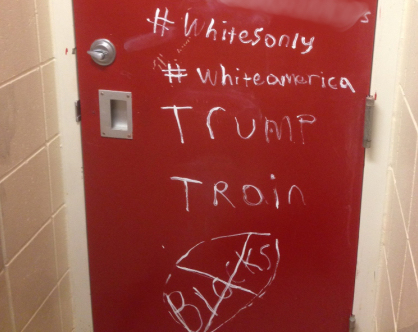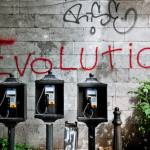We run our website the way we wished the whole internet worked: we provide high quality original content with no ads. We are funded solely by your direct support. Please consider supporting this project.

Responding to the Negative Fallout of Trump’s Election
Yesterday I suggested that we refrain from judging the motivations of brothers and sisters who voted for Donald Trump (see post). As the young lady I spoke with illustrates, a person could genuinely grieve over the negative implications Trump’s Presidency might have for certain people groups but nevertheless believe that there are considerations that outweigh these negative implications – the overturning of Roe verses Wade being a case in point. But whether or not you believe there were reasons for voting for Trump that outweighed these negative implications, the fact remains that his status as President elect is already having this effect.
To give just a few anecdotal illustrations, I have several Middle Eastern acquaintances that, over the last few days, have had white people shout at them to “go home.” I have heard from several parents whose non-white children were told by certain classmates that they were going to be deported now that Trump is president. Several days ago I learned of a conservative Muslim American couple that decided it was no longer safe for their daughter to wear a hijab. Along the same lines, the day after the election, a high school here in the Twin Cities found racist graffiti (a sample is pictured above) written in several locations. And I have read that some women, especially women who have experienced sexual assaults in their past, are suffering high levels of anxiety just knowing that a man who bragged about sexually assaulting women will soon become the most powerful person on the planet, sending the message that this kind of behavior is no big deal.
In an article published since the election, *Jonathan Martin similarly reflected:
After getting done with our Election Day communion service Tuesday night, I walked over to a sushi restaurant in downtown Tulsa for a bite. Things had just started to really turn in the election coverage. The guys who work in the kitchen, all from Mexico, were terrified. They said that if Trump won, they were so nervous about what it could mean for them that they would not show up for work the next morning.
Last week I sat across the table from a black pastor friend of mine, who leads a church he founded in rural Salisbury, NC. He was telling me harrowing stories he and his congregation have been experiencing on the ground, with a sudden surge in activity from white supremacists groups in their area, who openly cite the Trump campaign.
My best friend’s daughter, a 4th grader, went to her school yesterday in Cleveland, TN, where her classmates started loudly chanting “Build that wall! Build that wall! Build that wall!” to a Latino classmate.
A young woman who attends a church founded by one of my mentors was told by one of her students yesterday, “Donald Trump won. Get the f#@^ out of our country!”
It is simply undeniable that America has, literally over night, become a less welcoming if not openly threatening place to many people who are not white males. Whether this continues to be true will depend, in large part, on what the future leader of our country says and does while in office. One can only hope and pray that he will address situations like the ones I’ve mentioned. But whether or not this continues, there are right now multitudes of people who are living in fear and who are feeling unwelcomed by, and betrayed by, a country they love and identify with. And whether or not you were among those who felt there was a greater good that outweighed the possibility that Trump’s presidency might have this negative effect on minorities and women, it is incumbent on all of us who are not directly impacted to enter into solidarity with all who are.
I encourage us to earnestly pray for all who are currently feeling vulnerable in light of this election. And while we of course cannot control the actions of anyone else, including the actions of our soon-to-be-president, I encourage us to go out of our way to communicate to these individuals that we share their pain and that we will put ourselves on the line to love and serve them. Let’s commit to being a people who love all others the way Christ has loved us, giving his life for us when we were in need (Eph 5:1-2).
*I highly recommend that you take some time to read the full text of Jonathan’s reflections here. It’s lengthy, but thought-provoking, beautifully written, and deeply convicting.
Photo credit: CBS Minnesota
Category: General
Tags: Kingdom Living, Love Your Neighbor, Politics, Racism, Sexism, Xenophobia
Topics: Ethical, Cultural and Political Issues
Related Reading

The Cost of Holding On
Given Greg’s recent Twitter comments on the question of how we view what we own, we thought this article in the New York Times was particularly timely. What is the cost of holding onto things? As we accumulate more and more possessions, do we pay a price beyond the actual price tag? Although this piece…

Jesus was Not a [Socialist]
Article by Dan Kent Our political climate right now exhausts me. The fracturing. The bullying. The ideological mobs. I feel like I’m surrounded by a hundred Towers of Babel babbling at me all day long, pummeling me with endless propaganda and page-after-page of facts. “Look at the facts!” they implore. They want me in their…

God’s Warriors
Greg’s ideas on faith and politics were featured in the Peabody Award-winning CNN Presents: God’s Warriors. Watch the full video below. For more information, including behind the scenes footage, visit God’s Warriors – Special Reports from CNN.com.

7 Ways to Join the Kingdom Revolution
In the previous post, I introduced in short form the call to participate in the kingdom revolution that Jesus began. What does this mean for us today? Let me offer seven ways we are called to the Jesus revolution: When Jesus set aside the riches of his divine prerogatives and sided with the poor and…

The Image of Cross-Like Love: God’s Self-Portrait, Part 6
In the previous blog I argued that God is cross-like love. In this blog I’d like to take this a step further by demonstrating why the cross alone could function as the definitive revelation of God’s true character and by showing how this revelation weaves together everything Jesus was about. If you want to know…

Q&A: Already-Not-Yet
Question: My question is regarding our “entanglement” with Christ that you spoke about a few weeks ago. In the sermon you noted how we are joined with Christ like those two particles that can be separated by light years of distance and yet both will react equally to a force acting on the other one. So here is my question: If…
